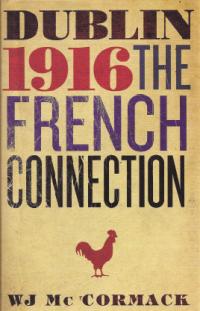Dublin 1916 and the French connection
Published in 20th Century Social Perspectives, 20th-century / Contemporary History, General, Issue 2 (March/April 2013), Reviews, Revolutionary Period 1912-23, Volume 21
Dublin 1916 and the French connection
W.J. McCormack
(Gill and Macmillan, €29.99)
ISBN 9780717154128
‘What was to unfold in Ireland, between 1911 and 1921’, writes W.J. McCormack, ‘was effectively an ideological battle to fill the cheap places, to draw the lower middle class into this cause or that, social revolution, imperial retrenchment or nationalist separatism’ (p. 82). ‘Cheap places’ refers to a review of musical culture in the Dublin of 1913, in which the writer noted that the popularity of Wagner ‘grows and grows’. McCormack’s undertaking is to trace the ways in which challenging and often controversial ideas from Europe were conveyed to Ireland via intellectuals, after which they were absorbed (often unconsciously) by the general population. This is an extremely difficult task and McCormack submits a truly impressive range of material in the course of his quest, from the French syllabus read by Pearse and others at the Royal University of Ireland through articles in the Irish Review to the more circuitous connection between the French poets read by Yeats under the guidance of Iseult Gonne, who, through her father Lucien Millevoye, had some contact with the literary salon of the writer and right-wing politician Maurice Barrès.
The introduction comprises a letter from McCormack to Fergal Tobin, of Gill and Macmillan, the book’s publisher. In it he sets out the preoccupations and influences that prompted him to write the book and the main issues it aims to address. It is always interesting to read an academic’s reflections on his or her intellectual life and it is particularly relevant in a book that is so infectiously fascinated with the philosophical and political influences of its subjects. McCormack sets out his objective to investigate three kinds of contemporary influence on the Easter Rising: retrospective nationalism, revolutionary syndicalism and Catholic Revival literature. He is interested in tracing an alternative intellectual French heritage to the republicanism of 1789 and asserts that the ‘French influences traced throughout the book are neither liberal nor leftist in any convincing way’ (p. 12).
McCormack’s journey begins with an analysis of the 1916 Proclamation. He breaks down its 486 words and explores the context and meaning of the most frequently occurring (‘arms’ appears five times, ‘freedom’ three, and ‘Irish’ thirteen) and the schema of historic events implicit in the Proclamation. McCormack suggests that ‘One drastic textual placement of the Easter Proclamation would treat it as a later than final, brief and unashamedly illegal issue of The Irish Review’ (p. 95). This is a reference to the fact that so many signatories of the Proclamation had also been editors and contributors to the journal. And so it is in the pages of the Irish Review that McCormack finds fertile ground in his search for influences among the considerable quantity of non-Irish, and specifically French, material carried in the journal. The Irish affinity for France, McCormack argues, grew from shared Catholicism (in the majorities), the influence of French orders in Irish schools, and through the prestige of France and its long tradition of culture and historical reflection.
Of Patrick Pearse, McCormack notes that in terms of ego-psychology he combined ‘an unusual determination with an equally unusual imperception of real surroundings’ (p. 79). Catholic periodicals presented Pearse after his death as the ideal martyr for the new state (having been supplied with the tools by Pearse and his surviving relatives). McCormack observes that ‘biography remains discreet’ regarding Pearse’s non-Catholic father, but also notes (in contradiction) that both recent biographers say that he was Unitarian (before converting to Catholicism for professional reasons). James Pearse was a self-educated member of the English working class who was an ardent follower of the radical politician Charles Bradlaugh and whose library reflected the interests of Victorian sceptics and agnostics. Both Joost Augusteijn and Brian Crowley have written extensively about James Pearse, yet McCormack writes as if Pearse Snr’s non-Catholic, English background remains a dark, unacknowledged secret among academics.
The author sees his book as a challenge to the custodians of the myth of the Rising who ‘prohibit any modification (however minor) or critique (however obscure)’ (p. 5). He anticipates that ‘some readers might be offended at the pigeon-holing of their foundation myth as a foundation myth, preferring to regard it as a self-evident truth’ (p. 15). One can’t help feeling that it is McCormack himself who refuses to move on. His assertion that ‘Much historical research devoted to the Rising, especially in recent years, has been produced by scholars who feel more ideologically at home with Pearse than with Yeats, the latter being regarded as less fully Irish, odd in his religious beliefs (if he had any), and insufficiently respectful of the common man’ (p.164), is barely comprehensible and, significantly, unburdened by examples.
Nevertheless, Dublin 1916 is an undoubtedly brilliant, if at times convoluted, meditation on cultural influences. McCormack builds a complex matrix from Bourgeois to Sorel, charting the reading materials and written work of Irish intellectuals. He then removes to the 1920s and 1930s to examine subsequent German interpretations of the Rising. He sets up a nice joke, too, on the fact that Eamon Ceannt was probably not an intellectual though he played bagpipes at a papal audience: ‘one might modify an old phrase to define the intellectual as a person who can play the bagpipes—but doesn’t’ (p. 84). Heavy ideas were being conveyed to the cheap seats and McCormack gives a great sense of the energy of those framing new possibilities, protecting old interests and negotiating new relationships. In doing this he takes the reader on a vertiginous, if idiosyncratic, ride. HI
















